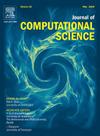Discrete fractional neural networks within the framework of octonions: A preliminary exploration
IF 3.7
3区 计算机科学
Q2 COMPUTER SCIENCE, INTERDISCIPLINARY APPLICATIONS
引用次数: 0
Abstract
Conventional neural networks constructed on real or complex domains have limitations in capturing multi-dimensional data with memory effects. This work is a preliminary exploration of discrete fractional neural network modeling within the framework of octonions. Initially, by introducing the discrete fractional Caputo difference operator into the octonion domain, we establish a novel system of discrete fractional delayed octonion-valued neural networks (DFDOVNNs). The new system provides a theoretical support for developing neural network algorithms that are useful for solving complex, multi-dimensional problems with memory effects in the real world. We then use the Cayley–Dickson technique to divide the system into four discrete fractional complex-valued neural networks to deal with the non-commutative and non-associative properties of the hyper-complex domain. Next, we establish the existence and uniqueness of the equilibrium point to the system based on the homeomorphism theory. Furthermore, by employing the Lyapunov theory, we establish some straightforward and verifiable linear matrix inequality (LMI) criteria to ensure global Mittag-Leffler stability of the system. In addition, an effective feedback controller is developed to achieve the system’s drive-response synchronization in the Mittag-Leffler sense. Finally, two numerical examples support the theoretical analysis. This research introduces a novel direction in neural network studies that promises to significantly advance the fields of signal processing, control systems, and artificial intelligence.
八进制框架内的离散分数神经网络:初步探索
传统的基于实域或复杂域的神经网络在捕获具有记忆效应的多维数据方面存在局限性。这项工作是在八进制框架内离散分数神经网络建模的初步探索。首先,通过将离散分数阶Caputo差分算子引入到八元域,建立了一种新的离散分数阶延迟八元值神经网络系统。新系统为开发神经网络算法提供了理论支持,这些算法可用于解决现实世界中具有记忆效应的复杂多维问题。然后,我们使用Cayley-Dickson技术将系统划分为四个离散的分数阶复值神经网络,以处理超复域的非交换和非结合性。其次,基于同胚理论,建立了系统平衡点的存在唯一性。在此基础上,利用Lyapunov理论,建立了一些直接且可验证的线性矩阵不等式(LMI)准则来保证系统的全局Mittag-Leffler稳定性。此外,设计了一种有效的反馈控制器,实现了系统在Mittag-Leffler意义上的驱动-响应同步。最后,通过两个数值算例对理论分析进行了验证。这项研究为神经网络研究引入了一个新的方向,有望显著推进信号处理、控制系统和人工智能领域的发展。
本文章由计算机程序翻译,如有差异,请以英文原文为准。
求助全文
约1分钟内获得全文
求助全文
来源期刊

Journal of Computational Science
COMPUTER SCIENCE, INTERDISCIPLINARY APPLICATIONS-COMPUTER SCIENCE, THEORY & METHODS
CiteScore
5.50
自引率
3.00%
发文量
227
审稿时长
41 days
期刊介绍:
Computational Science is a rapidly growing multi- and interdisciplinary field that uses advanced computing and data analysis to understand and solve complex problems. It has reached a level of predictive capability that now firmly complements the traditional pillars of experimentation and theory.
The recent advances in experimental techniques such as detectors, on-line sensor networks and high-resolution imaging techniques, have opened up new windows into physical and biological processes at many levels of detail. The resulting data explosion allows for detailed data driven modeling and simulation.
This new discipline in science combines computational thinking, modern computational methods, devices and collateral technologies to address problems far beyond the scope of traditional numerical methods.
Computational science typically unifies three distinct elements:
• Modeling, Algorithms and Simulations (e.g. numerical and non-numerical, discrete and continuous);
• Software developed to solve science (e.g., biological, physical, and social), engineering, medicine, and humanities problems;
• Computer and information science that develops and optimizes the advanced system hardware, software, networking, and data management components (e.g. problem solving environments).
 求助内容:
求助内容: 应助结果提醒方式:
应助结果提醒方式:


